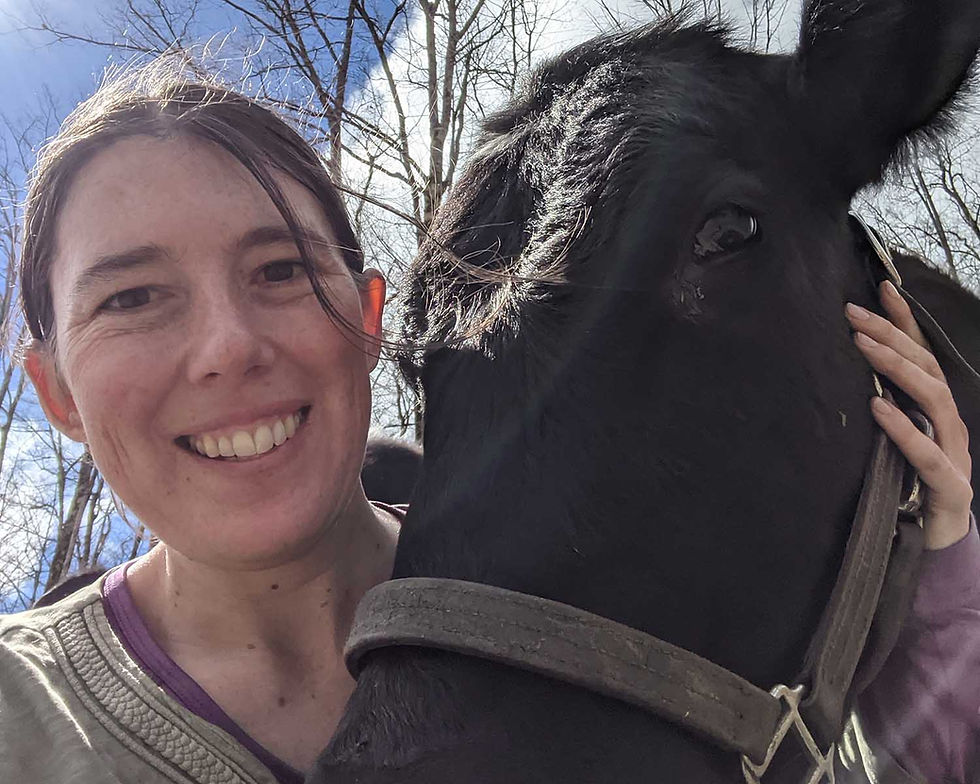What Makes Milk from Heritage Breed Cows Unique Compared to Regular Cows?
- Hilary Elmer
- Apr 26, 2024
- 3 min read
Updated: Jun 24
Back in the 1960's a type of technology became widely available that revolutionized milk production.
Suddenly, instead of raising the cows that people's ancestors had raised, and that had been selected over generations to thrive in a region, farmers had access to artificial insemination. They could "upgrade" their cows to bigger, heavier producing holsteins (the black and white cows that have become the poster child of dairy cows).
Who doesn't love more milk, right?
In the decades that followed, intensive breeding has continued to push the envelope of how much milk a cow can produce. Extreme breeding selection, coupled with grain- and soy- heavy feed, scientifically formulated supplements, and frequent vet visits, have doubled, tripled, quadrupled the milk yields of historic unimproved breeds.
Understanding that farmers who sell to co-ops are struggling just to make ends meet, you can't blame any farmer for wanting more milk from their cows.
Heavy milk yields come at a price, though.
High yielding cows tend to get mastitis.
High yielding cows tend to get milk fever.
High yielding cows tend to get hoof rot.
High yielding cows tend to get ketosis.
High yielding cows tend to get acidosis.
High yielding cows tend to get nutrient deficiencies.
High yielding cows tend to get pendulous udders.
High yielding cows ALWAYS look like a bag of skin and bones.
Grass is what cows were designed to eat. But if you feed one of those milk-machines just grass (whether she's a holstein, jersey, or any other modern, high yielding cow), she will milk herself to death. If she is not getting carefully formulated high energy, high protein feed, she will put her own nutrients into the milk and literally starve.
Now let's talk about my cows.

My cows are Lynch Linebacks. They are what we call a heritage breed, because they haven't been "improved" through extreme breeding and diet.
Back in the 1960's, there was a guy in Ontario named Robert Lynch. He saw what was happening to his neighbors' herds, and he decided to not upgrade his cows. He liked them just the way they were.
They didn't make as much milk as the upgrades, but they sure were easy keeping. And they didn't eat as much.
For 50 years he kept a closed herd (meaning that he didn't bring in outside genetics) and watched as all the other linebacks in his region disappeared. He kept only his best cows for breeding and preserved a precious genetic line.
About 10 years ago, he started getting old. He couldn't continue caring for his cows. A younger generation of farmers who appreciate pre-industrial genetics dispersed his herd and now have a breeders' group.
I am lucky to have the first herd of Lynch linebacks in the states (my foundation stock came from Canada).
I have found that Lynch linebacks are wonderful, rugged dairy cows. They have a good disposition. Their udders are beautiful (which is not true of many heritage breeds). They are well fleshed, not skin and bones. They have basically zero health problems, because they only make as much milk as their diet provides. The only health problems I have encountered with them were my own fault, because there was a LOT I didn't know about keeping cows prior to learning it the hard way.
Why does it matter what breed of cows your farmer keeps?
It matters because you want healthy milk!
You want milk that is free of antibiotics. You want milk from a cow that is not living in a state of constant inflammation. You want milk that is
packed with nutrients because it comes from an animal that is eating exactly what nature designed her to eat.
Much of the so-called lactose intolerance today is a result of the way milk is processed with high temperature pasteurization and homogenization. But I believe that the health of the cows and the composition of their diet also plays a big role.
I once heard a dairy farmer say, "it's always the good ones that get sick."
That stuck with me.
It betrays what co-op farmers value: PRODUCTION at all costs.
In my mind, a "good one" is a cow that never gets sick, that makes a reasonable amount of milk on just the grass or hay that she eats. A cow that makes the most nutritious, delicious raw milk for me to sell to my customers.
Lynch linebacks are good cows.

There are other lineback breeds besides Lynch linebacks. American linebacks are a beautiful, speckled cow that have "improved" high milk yields and require a concentrated diet. Randall linebacks are a heritage breed that is also speckled. Some farmers have cows that look just like mine, but they are not from Robert Lynch's herd and they have been bred for increased yields. In other words, just being a lineback doesn't make it a Lynch lineback.






Comments